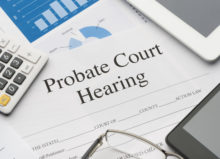Making a Claim in an Estate

Someone owes you money. You’d like to collect that money. Unfortunately for you, that someone passed away. Now what? You don’t want to write it off, but how on earth do you collect money from someone who died? The answer: make a claim in the estate.
Where to start?
To make a claim in an estate, the creditor must go through the court system. The creditor first files a Statement of Claim in the probate matter for the decedent, or the person who died. If a claim is filed and it is timely, the court will not close the matter until the claim has been satisfied or the personal representative shows that funds are not sufficient to cover it.
What is a Statement of Claim?
A Statement of Claim contains the essential debt information. A creditor submits the Statement to the court, and the clerk posts it on the docket. The claim in an estate includes: the name and contact information of the creditor, the basis of the claim, the amount owed, whether or not the claim is secured, and the due date of the debt. It is important to include all of the above-mentioned pieces so that the court can properly determine the order in which your claim will be paid.
What does “timely” mean?
Timely means on time. If a claim is late, the creditor is out of luck. The claim is barred. A creditor may not file a claim against any decedent more than two years after the debtor died. The personal representative of the estate may shorten that two-year window by publishing a Notice to Creditors in the paper. Following publication, creditors have 90 days to file their claim.
The 90-day window may enlarge a bit if the personal representative knows or should know about the debt. In that case, the personal representative must serve the Notice to the creditor directly. The creditor can then file a claim 30 days after the Notice is served, or until the end of the 90-day creditor period, whichever is longer.
Note that, even after these time limits, a creditor will still have a security interest in any secured debt. You can’t get rid of a mortgage or car loan that easily!
Can the personal representative object to a claim?
There are two situations where the personal representative can object to a claim. The first is if the claim is untimely. As stated above, if a claim is late, the creditor is out of luck. The courts are absolutely diligent about that. The second is an unfounded claim. The personal representative can object if the claim is for services never rendered, or if the creditor claims more than it should. .
But there is no probate, now what?
Some cases do not require the probate process. A creditor has a few options if no probate matter is open. One option is to file a caveat with the court. A caveat is a document that a creditor files stating they have a claim. When the probate process opens, the personal representative will know there is a creditor in the estate. And the creditor is notified that the probate process has begun.
But it is possible that the estate will never go through the probate process. In that case, the creditor has the option of opening the estate. Anyone qualified under the statute, can serve as the personal representative and open an estate. Take note, that if a creditor opens probate, beneficiaries of the estate may fight to take over as personal representative. Most likely they will win. But at least the probate matter is open, and the creditor can file his claim.
What if there are no probate assets?
Only certain assets are part of the probate process. Estate attorneys work very hard to help their clients arrange their finances to avoid probate. One method is through a Trust. Does that mean that there are no assets to pay creditors? Not necessarily. Putting assets into a revocable Trust might escape the probate process, but it won’t escape creditors. If assets in the probate estate are insufficient to pay for the administration of probate (including creditor claims), the Trustee must pay those costs from the Trust.
However, sometimes there just aren’t any assets. The decedent may have died without any assets or owing more money than she had. When this happens, the estate is insolvent, and the court orders payment to creditors in a certain order. The personal representative may pay some claims in full, some in partial, and some not at all.
It doesn’t pay to procrastinate
If someone dies owing you money, make a claim in the estate to secure your right to get paid. And do it right away! The right attorney can help you file your claim correctly.










